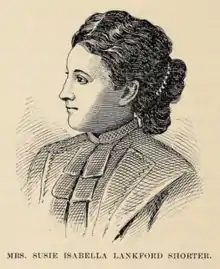Susie Lankford Shorter
Susie Isabel Lankford Shorter (January 4, 1859 – February 23, 1912) was an American educator, philanthropist, and writer.
Susie Lankford Shorter | |
|---|---|
 Susie Isabel Lankford Shorter, from an 1893 publication. | |
| Born | Susan Isabel Lankford January 4, 1859 Terre Haute, Indiana |
| Died | February 23, 1912 (aged 53) |
| Nationality | American |
| Education | Wilberforce University |
| Known for | Educator, writer |
Notable work | "Lifting as We Climb" |
| Spouse(s) | Joseph Proctor Shorter
(m. 1878–1910) |
Early life
Susan Isabel (or Isabella) Lankford was born in Terre Haute, Indiana, the daughter of Whitten Strange Lankford and Clarissa Carter Lankford. Her father was a minister in the African Methodist Episcopal Church. She was educated at Wilberforce University in Ohio.[1]
Career
Susie Lankford taught for a few years before she married.[2] As a faculty wife at Wilberforce, she ran a student store, offered a free kindergarten for local children, and provided care for sick students in her home. She was president of the Wilberforce Ladies' College Aid Society.[3]
Shorter wrote articles for church publications. Her booklet "Heroines of African Methodism" (1891) was written to celebrate the eightieth birthday of Bishop Daniel Payne.[3] "We are proud of our women," she wrote. "Little has been written concerning them. They are walking in all life's avenues successfully, daring and doing what the women of other varieties of the human race dare and do."[4] She also wrote a column, "Plain Talk to Our Girls", for Ringwood's Afro-American Journal of Fashion, published by Julia Ringwood Coston.[5]
She wrote the song, "Lifting as We Climb",[6] for the Ohio chapter of the National Association of Colored Women's Clubs.[7]
Personal life
Susie Isabel Lankford married Joseph Proctor Shorter, a professor at Wilberforce University, in 1878. They had eight children together; at least three of their children died before reaching their teens. Susie Lankford Shorter was widowed in 1910 and died in 1912, aged 53 years.[3]
References
- Hallie Q. Brown, Homespun Heroines and Other Women of Distinction (Oxford University Press 1988): 205–206. ISBN 9780199763092
- Lawson Andrew Scruggs, Women of Distinction: Remarkable in Works and Invincible in Character (Scruggs 1893): 162–163.
- Jessie Carney Smith, ed., Notable Black American Women, Book 2 (VNR AG 1996): 595–597. ISBN 9780810391772
- Monroe Alphus Majors, Noted Negro Women: Their Triumphs and Activities (Donohue & Henneberry 1893): 147.
- Noliwe M. Rooks, Ladies' Pages: African American Women's Magazines and the Culture that Made Them (Rutgers University Press 2004): 30. ISBN 9780813534244
- John Russell Hawkins, Centennial Encyclopedia of the African Methodist Episcopal Church, Volume 1 (AME Church 1916): 202.
- Charles Harris Wesley, The History of the National Association of Colored Women’s Clubs: A Legacy of Service (NACWC 1984): 54.
External links
- Susan Isabella Lankford Shorter's Ohio gravesite, at Find a Grave.